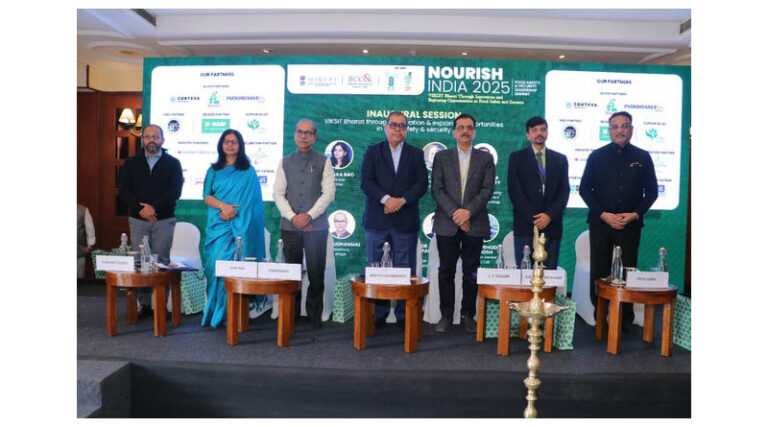
Nourish India 2025 Highlights Urgent Gaps in Food Safety and Traceability
21 November 2025, New Delhi: A strong push for advanced traceability, modern testing infrastructure and micro-enterprise empowerment is essential for India to enhance food safety, strengthen its supply chains and cement its global market credibility. This was the central message at Nourish India 2025 – Food Safety & Security Leadership Summit, organised by the Bengal Chamber of Commerce & Industry (BCC&I) and ICAR–NRCG, with support from the Ministry of Food Processing Industries (MoFPI).
Delivering the keynote address, Dr. J. P. Dongre, Director & DAMA, MoFPI, said that India’s food-processing sector must focus on deeper traceability, laboratory modernisation, and support for micro-enterprises to ensure global-standard food safety. He outlined MoFPI’s initiatives on integrated cold-chain development, processing clusters, and formalisation of small food businesses under key government schemes. These interventions, he noted, are designed to expand infrastructure and help entrepreneurs comply with rigorous safety requirements across the value chain.
Representing the regulatory framework, Dr. Alka Rao, Advisor, FSSAI, highlighted India’s progress in adopting science-based regulations, strong pesticide-residue frameworks, and Codex-aligned standards. She called for expansion of accredited laboratory networks and responsible use of agri-inputs to further strengthen India’s domestic and export-oriented food ecosystem.
From the export perspective, Dr. Sudhanshu, Secretary, APEDA, commended India’s advancements in digital traceability systems, which he said have increased transparency and strengthened buyer confidence. He stressed the need for consistent farmer training, adherence to Good Agricultural Practices (GAP) and uniform quality management to maintain India’s global market position.
Providing industry insights, Dr. Prem Garg, National President, Indian Rice Exporters Federation, said that India must transition from bulk commodity shipments to premium, branded and traceable rice exports. He emphasised modern packaging, sustainability protocols and strict quality management as key to improving India’s competitiveness in global rice markets.
Offering a financial-sector perspective, Vishal Sharma, Deputy General Manager, NABARD, said food safety and security depend on ensuring access, availability and affordability—factors closely linked to the efficiency of India’s food-processing ecosystem. He shared that NABARD continues to support the sector through refinancing schemes, financing for storage and cold-chain facilities, and credit facilitation measures for food-processing units.
The summit concluded with a collective call to accelerate India’s progress towards Viksit Bharat, grounded in transparent supply chains, science-led regulation, empowered micro-enterprises and globally benchmarked processing capabilities. Speakers emphasised that these reforms are essential to strengthening India’s future in food safety, nutrition and export competitiveness.
Also Read: UPL’s Low-Methane Rice Project Wins Global SBCOP Award at COP30
📢 If You’re in Agriculture, Make Sure the Right People Hear Your Story.
From product launches to strategic announcements, Global Agriculture offers unmatched visibility across international agri-business markets. Connect with us at pr@global-agriculture.com to explore editorial and advertising opportunities that reach the right audience, worldwide.






